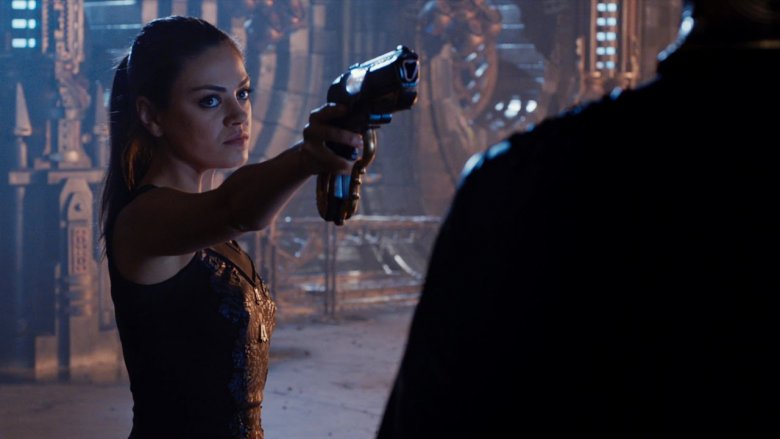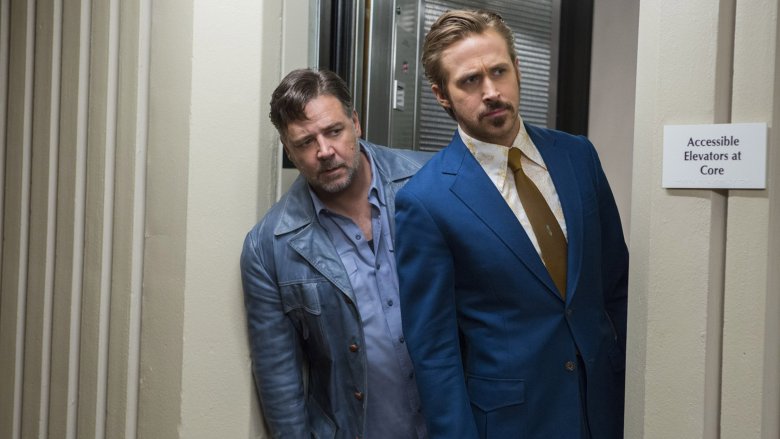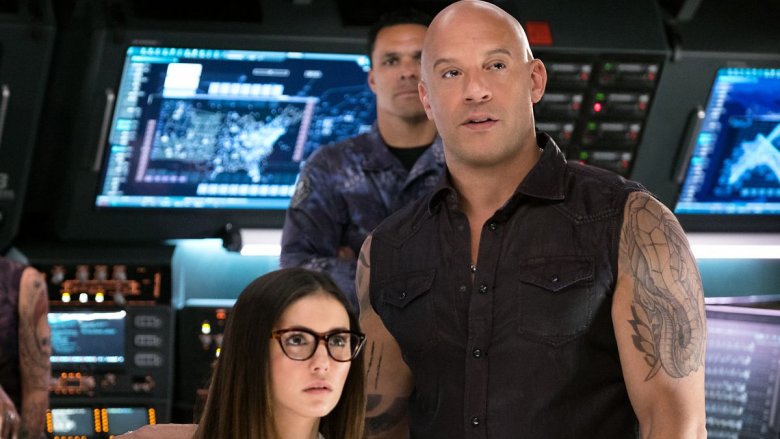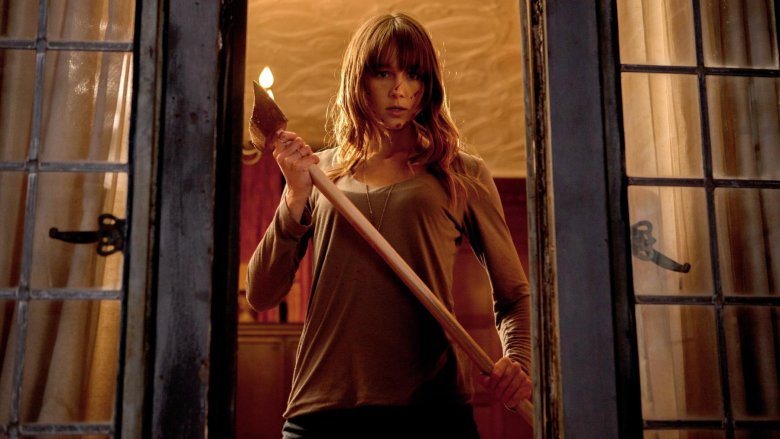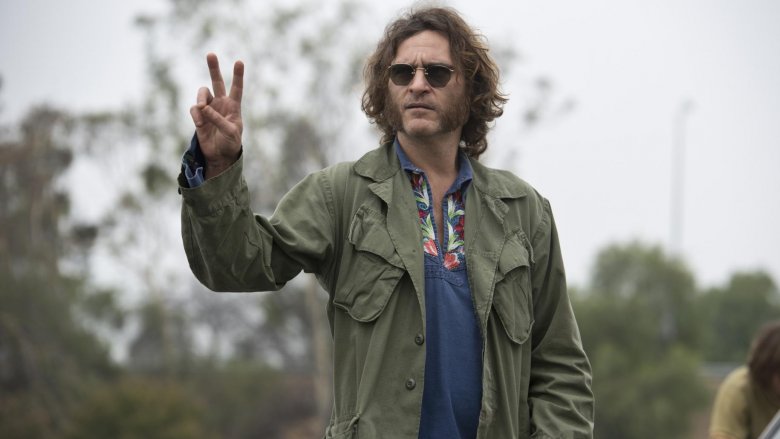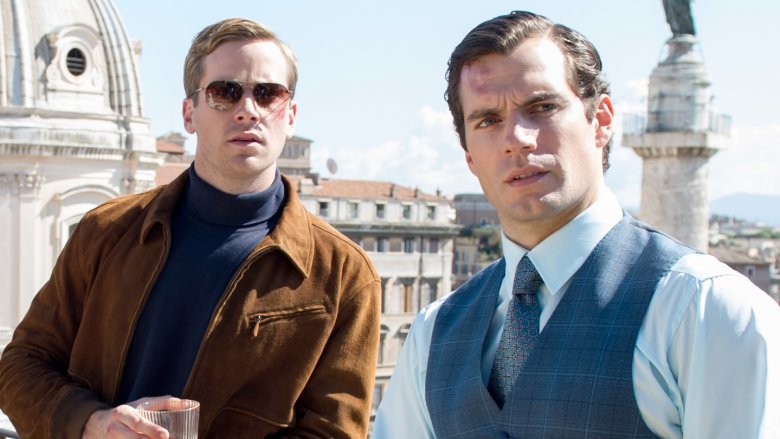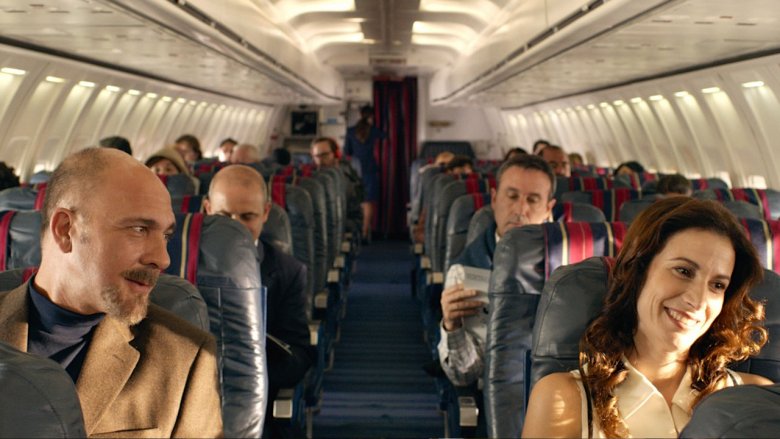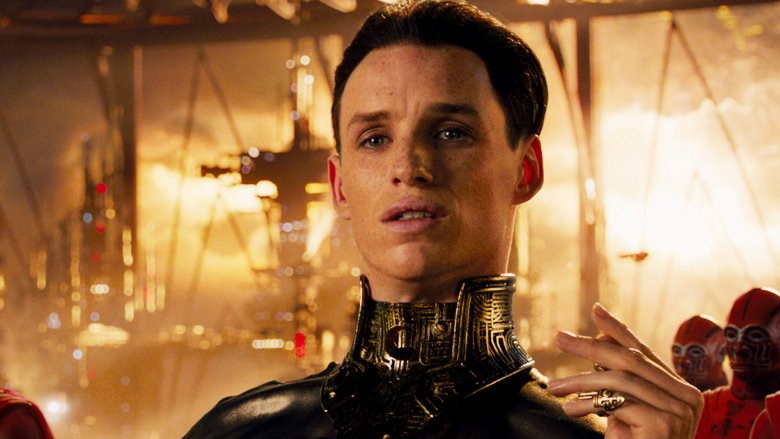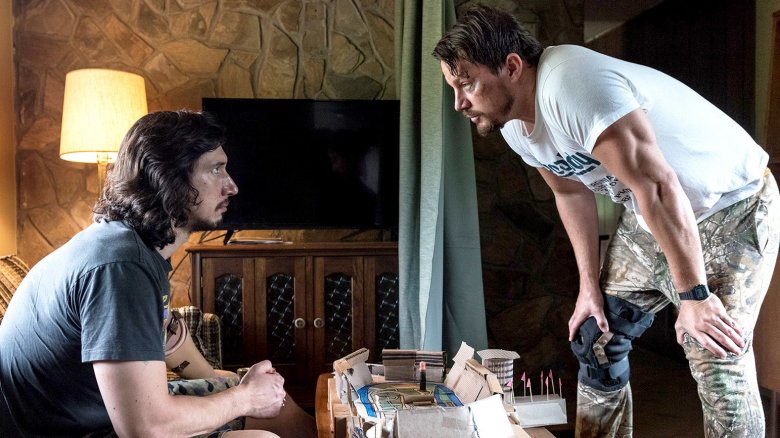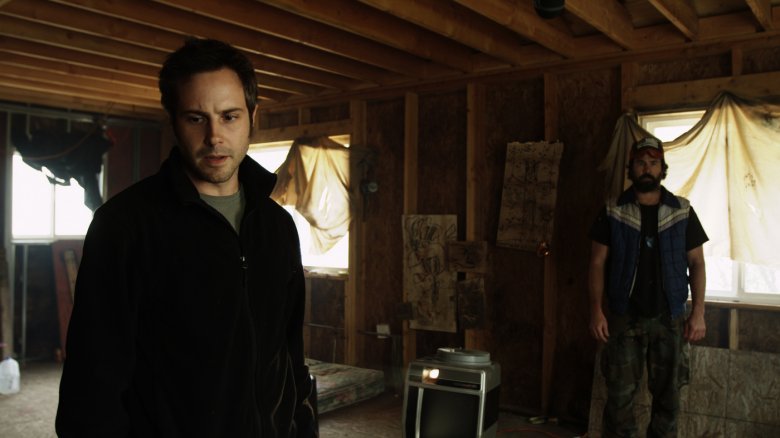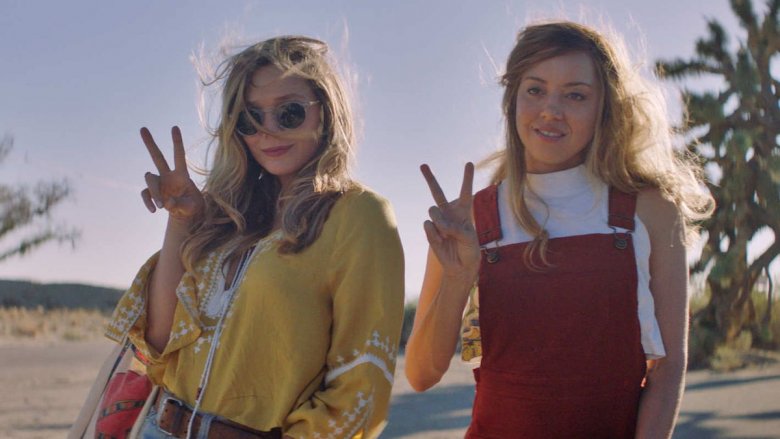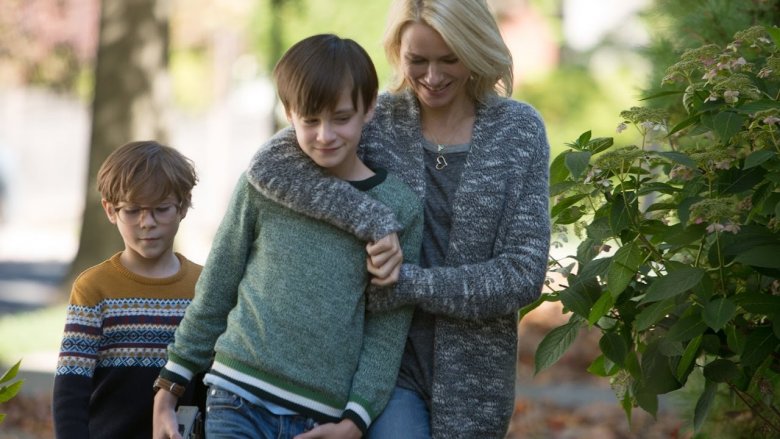Current Movies That'll Be Cult Classics In 20 Years
As easy as it can sometimes be to get sucked into arguments about box office returns and award nominations, the true worth of a movie isn't always appreciated upon release. Just look at genre legend John Carpenter's much-lauded The Thing, which was critically reviled when it premiered and completely bombed at the box office. Today, you'd have to actively search for any sci-fi or horror fan that wouldn't count the film among their all-time favorites.
Generally, a good cult classic film needs to have failed upon release in some way, either in box office or critically—there has to be a starting point for a "cult" to rise up around it after all. With that in mind, we've assembled a comprehensive list of easily-missed films from the past six years that will undoubtedly live on for decades. From an early work by a master of horror to an action sequel starring arguably the greatest living movie martial artist, these modern-day films are sure to be cult classics in 20 years.
The Nice Guys
You likely know Shane Black more as a writer than a director. His writing on Lethal Weapon, Lethal Weapon 2, The Last Action Hero, and Predator defined Black as a unique talent in Hollywood, able to blend together stunning action sequences with character-driven comedy and identifiable wit. Still, despite an accomplished resume as a writer, Black's best film is one he directed: The Nice Guys. The 2016 film follows an alcoholic private eye named Holland March (Ryan Gosling) who teams up with Jackson Healy (Russell Crowe), a no-nonsense tough guy, to track down a missing girl in 1970s Los Angeles.
All of the classic Shane Black touches are present in The Nice Guys, like snappy dialogue and a precocious child pushing the broken leading men to be better. The best thing about the movie is Gosling's performance, though. He's absolutely fearless in playing Holland March as an odious, pathetic man—he shrieks and pratfalls through the film with incredible comedic timing. Crowe holds his own as well, giving a reserved weight to Jackson Healy and showing off the best acting he's done since Gladiator. Unfortunately, despite the all-star cast, the film slipped right past moviegoers, barely making more than its budget, despite rave reviews. Time will be kind to this film, though; it's career-best work from everyone involved and one of the finest neo-noirs since The Long Goodbye.
xXx: The Return of Xander Cage
The original xXx was more of a hallucination of a movie than an actual concept. The high concept of the film was basically that super spies were old news. The threat of new super criminals needed a new breed of hero, the kind of hero that guzzled Monster energy drinks instead of Martinis. But xXx: The Return of Xander Cage, released an entire fifteen years after the first film, managed to achieve a beautiful synthesis between trash and art, like Duchamp's Fountain.
Everything is raised to the ex(Xx)treme here as Xander Cage (Vin Diesel) finds out that he isn't the only radical dude to go by the xXx moniker. Joining the world of the film is an all-star cast including Tony Jaa, Ruby Rose, Toni Collette, and Donnie Yen, and the film features some of the best fight choreography of the last few years. Even while Yen and Jaa backflip and kick their way through legions of goons, the story itself rises to a fever dream of stacked climaxes and ridiculous action set pieces. It's an unforgettable, insane film that's tailor-made for late night viewing parties and MST3K-style watch-fests.
You're Next
One-half mumblecore family drama and one-half survivalist horror, You're Next takes some particular glee at turning genre tropes on their head. The movie follows an estranged family whose vacation is interrupted by a crew of killers wearing animal masks, and what follows is a funny and violent, gore-filled romp. You're Next is directed by Adam Wingard, who you might recognize as the director of The Guest (one of the best John Carpenter homages made in the 21st century) and Death Note, and Wingard's macabre sense of humor shines through even here, in this earlier work.
When the twist comes—and we won't spoil it for anyone who hasn't yet seen the movie—You're Next leaps from a fun horror film into a soon-to-be cult classic. Unfortunately, audiences didn't turn out for the film in huge numbers, and Wingard says that an ambitious planned sequel (spoilers in the link) will never happen. On the plus side, the film itself is one of the better slasher films of the decade, and You're Next's penchant for homemade traps make it a great double feature with Home Alone, if you're planning a movie night.
Inherent Vice
If you've ever tried to read (and then quickly given up on reading) Gravity's Rainbow, then you know that author Thomas Pynchon isn't the kind of writer whose work lends itself easily to film adaptations. He writes strange, surrealistic tales full of conspiracies and events that just sort of end without the satisfying denouement that you'd expect from a blockbuster. Even Inherent Vice, easily his most approachable work, has long passages of drug-induced hallucinations and high-minded prose.
Still, if anyone had the skills to adapt Pynchon's work, it's Paul Thomas Anderson. With modern classics like Magnolia and There Will Be Blood, the director's made a career out of synthesizing crowd-pleasing epics with the kind of film techniques that film students study for decades. Anderson's adaptation of Inherent Vice isn't just excellent, it's a heady meeting of two of America's best artists, taking Pynchon's anxious, conspiratorial plotting and matching it with Anderson's reserved camerawork. It's the rare film that would just as easily belong in a film class as a stoner's basement television at three in the morning. Much the same way that the Coen brothers' The Big Lebowski has lived on for decades, you can guarantee that Inherent Vice will be watched for years to come.
The Man From U.N.C.L.E.
Director Guy Ritchie probably wouldn't be your first pick to helm a reboot of the sixties television show The Man from U.N.C.L.E. After all, Ritchie's known more for his foul-mouthed anti-heroes and penchant for ridiculous action scenes than for the kind of old-fashioned adventures common in classic TV. And yet, 2015's The Man From U.N.C.L.E. managed to be a clever, respectful reimagining of the original show without feeling detached from Ritchie's established filmmaking style.
Starring Henry Cavill and Armie Hammer as spies from opposite ends of the Cold War forced to team up, U.N.C.L.E. is smart, stylish, and extremely charming. Cavill's never been more suave than in the role of an American super-spy, and the movie is filled to the brim with eye-popping visuals and sixties period piece aesthetics. While U.N.C.L.E. didn't wow audiences (it barely made half of its original production budget), it's found a healthy life on home video after its theatrical run.
Wild Tales
Despite what you might think, getting nominated or even winning an Oscar award doesn't guarantee a movie's longevity. After all, who's still talking about The Reader (winner for Best Actress in 2008) or The Cider House Rules (Best Supporting Actor and Adapted Screenplay in 1999)? It's arguably even harder for the nominees and winners of Best Foreign Film to really make a long-lasting impact on the pop culture landscape.
However, even with all that said, we expect 2014's Wild Tales to foster a very healthy cult following as the years go on. The film is an anthology of stories about violence and vengeance, all written and directed by Damián Szifron. Each segment is short, snappy, and feels like The Twilight Zone mashed together with a classic Grindhouse vibe. Speeding motorists, vengeful brides, and homicidal cooks abound, and Wild Tales never lets any particular segment drag on too long. The performances and cinematography are absolutely stunning, particularly a segment that features long, beautiful shots of an Argentinian highway that looks straight out of a Fiat commercial—if a Fiat commercial also involved a fight to the death on the side of the road.
Jupiter Ascending
No one makes science fiction films quite like the Wachowskis. The original Matrix is a classic of the genre (enough to make you say "whoa") while their genre-bending Netflix original series Sense8 fostered a devoted cult following. But nothing quite gets at the sheer, unadulterated id of the filmmaking sisters like Jupiter Ascending. The film is absolutely nuts, blending fairy tale tropes with cyberpunk fashions, not to mention Channing Tatum as an angsty alien soldier dreamboat on jet-powered roller skates straight out of your middle school self-insert fanfiction.
A plot summary of Jupiter Ascending would be meaningless, because you're not watching for the intricacies of measured plotting. You're watching the film to see the Wachowskis create a space opera closer to the campy joy of Flash Gordon than a Star Wars film. Jupiter Ascending might be one of the biggest bombs on the list as the domestic theatrical return netted a paltry 47 million dollars compared to the jaw-dropping production budget of nearly 200 million. Was it a good idea to spend that much money on the cheesiest, weirdest space adventure made in decades? Maybe not, but it sure is a joy to watch anyway
Logan Lucky
It's certainly been a bit odd watching Channing Tatum become Steven Soderbergh's muse. The actor and director came together on the set of Magic Mike and have worked together on a score of projects afterwards. Easily the most charming film to come out of their creative partnership was Logan Lucky, a tongue-in-cheek Ocean's Eleven-esque heist film about two brothers who decide to rob the Charlotte Motor Speedway. The winking nods to Ocean's Eleven might come off as distracting or even mocking in the hands of anyone other than Soderbergh himself (who directed the George Clooney-starring trilogy), but Logan Lucky manages to feel reminiscent of the classic heist film without ever feeling indebted to it.
Even more, it's a genuine joy to watch Soderbergh assemble such a talented cast and let them carry the movie with their charm. Tatum joins Adam Driver, Riley Keough, Dwight Yoakam, and Daniel Craig (whose scene-stealing role as Joe Bangs, an incarcerated explosives expert, is a particular highlight). Still, despite the star power and rave reviews, the film barely managed to make back its budget domestically. Even so, Logan Lucky is an inordinately fun movie, and it's just waiting for an audience to catch on to its zany vibe.
Resolution
Anyone who thinks that there aren't any new ideas in horror owes it to themselves to see Resolution. Directed by the filmmaking team of Justin Benson and Aaron Scott Moorhead, the film follows Michael, a man attempting to save an old friend from meth addiction and a paranoid fantasy about aliens. Resolution is a gripping, claustrophobic movie, the kind of horror film that worms its way into your brain like a burrowing parasite.
Like Cabin in the Woods, Resolution is clearly influenced and engaged with horror as a genre, but Benson and Moorhead's relationship to their meta is much less obvious. It's a slower, more restrained film interested in the emotional story being told in addition to cleverly laying out genre tropes and parodies. Benson and Moorhead are on the rise, and their pseudo-sequel The Endless was one of the best horror movies of 2018, but Resolution is still likely to be an eternal feather in their cap. It's a slow-burning, mysterious film, the kind of movie that you come upon by chance and immediately show your friends—proof positive of a cult classic in the making.
Ingrid Goes West
There are plenty of films that take place in Los Angeles and Hollywood, but those which portray the culture of the City of Angels in a clear and recognizable way is surprisingly rare. Ingrid Goes West joins the hallowed halls of accurate Los Angeles movies with characters so real you would swear you've met them (or followed them on Instagram, at least). The film follows Ingrid (Aubrey Plaza), a mentally disturbed woman left adrift after her mother's passing. After she starts following an Instagram influencer named Taylor (Elizabeth Olsen), Ingrid starts following Taylor offline too, moving all the way to Los Angeles in a twisted and manipulative bid to become her best friend.
Ingrid Goes West is a grim but funny look at celebrity culture, social media usage, and the performative nature of friendship, all buoyed by an unshakable performance from Plaza. She injects genuine emotion and realism into a character that, in lesser hands, could have come off as a Millenial straw man. Ingrid Goes West didn't quite connect with audiences, but it's one of the most quintessential Los Angeles movies ever made.
The Book of Henry
Not all cult classics are actually good films. For every unloved masterpiece like John Carpenter's The Thing, there are movies that are so bad, so truly wretched that they loop back around to being entertaining. We're talking about films like Troll 2 or The Room, the kinds of movies that audiences watch just to laugh at the sheer audacity that any of the creatives involved believed they were laboring in the service of something good.
The Book of Henry is a modern-day Troll 2. It's a film so constantly surprising in how terrible it is that even the trailer can't seem to decide what genre the film is. The Book of Henry is so bizarrely awful that there's a fairly popular conspiracy theory that the film's sheer existence was enough to boot director Colin Trevorrow off of directing Star Wars: Episode IX. When a film is so legendarily bad that it almost interrupts the schedule of one of the biggest movie franchises of all time, that's how you know you're in for a treat. That's the sort of legend that truly builds a cult classic.
